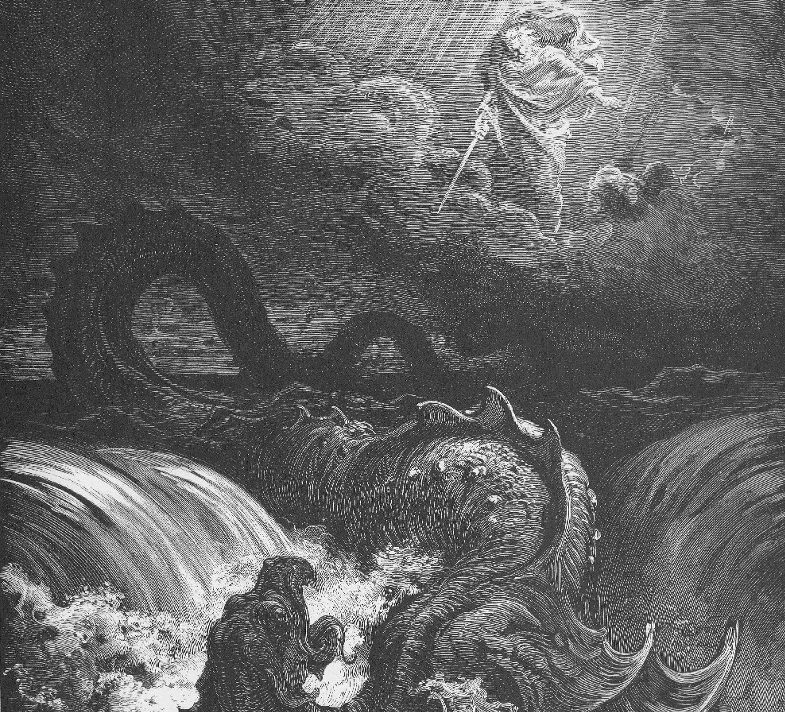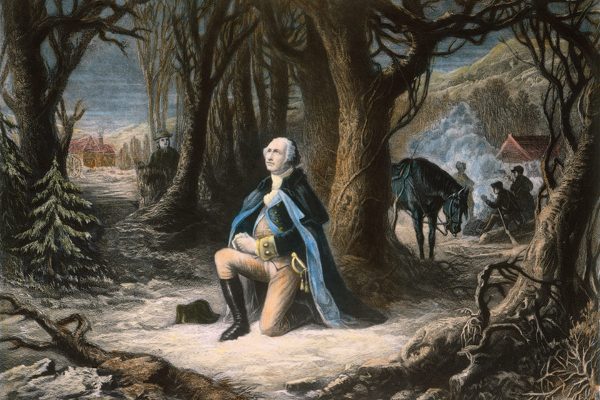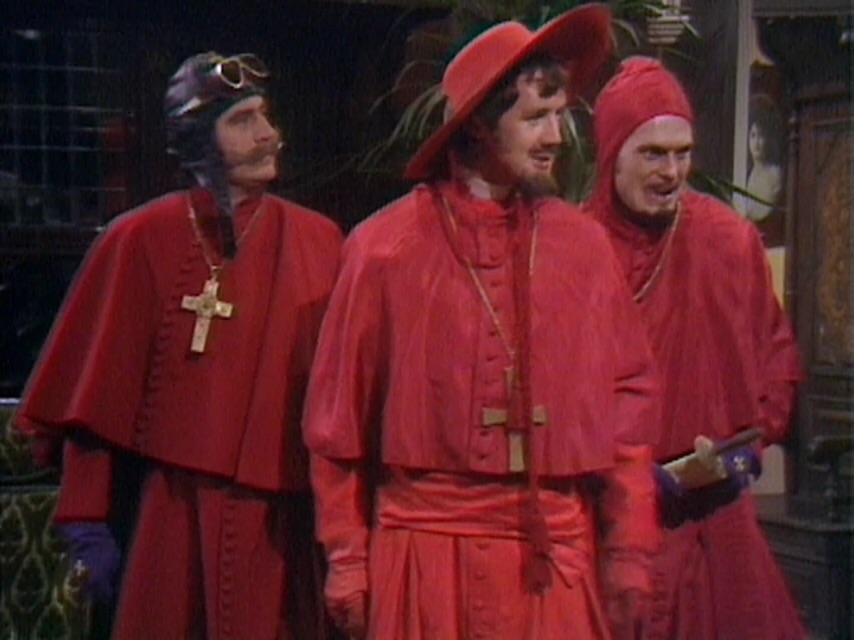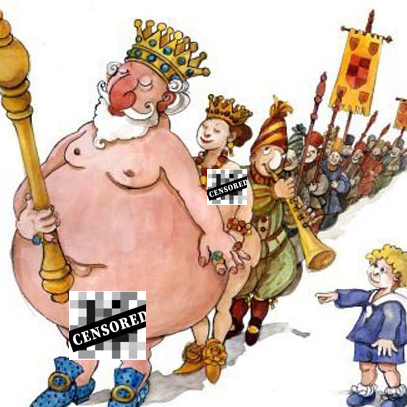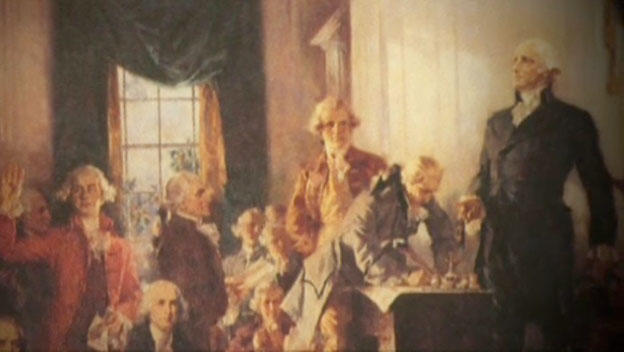Digital conditions, not competing intellectuals, will make it so.
Waiting for Charlemagne
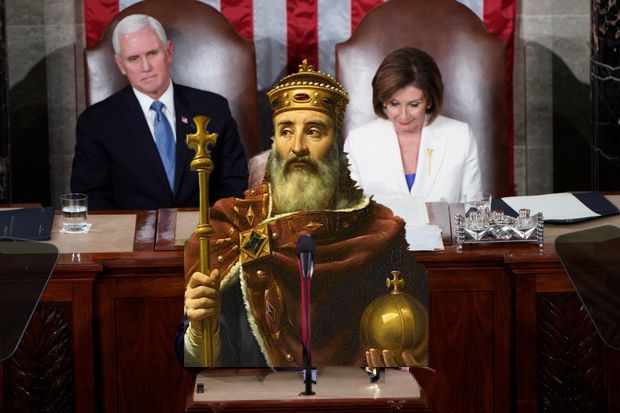
The Performance Artist We Deserve.
Adrian Vermeule, a Professor of Constitutional Law at Harvard Law School, recently provoked controversy by proposing that the American Right should develop a jurisprudence “based on the principles that government helps direct persons, associations, and society generally toward the common good, and that strong rule in the interest of attaining the common good is entirely legitimate.”
Both the manner in which his overarching thesis is considered controversial, and the studious insufficiencies of his own account, reveal our deep-rooted ignorance. We are all squabbling, petulant children playing amidst the ivy and other weeds growing on the ruins of a once-great civilization.
This is not Vermeule’s fault. Unlike most, he is willing to make claims that stand against the shallow stream of delusive platitudes flowing forth from our fetid “elite” institutions. Nor is he ignorant. He is more keenly aware of the present landscape, at least, than many of his peers.
Is this recent Roman Catholic convert the charismatic leader of a phalanx of neck-bearded, traditionally-minded young men with a cunning plan to install themselves into positions of power and erect the fascist theocracy we deserve or need (take your pick)? Or is he an undercover “fed” who has infiltrated the conservative Right only to discredit it in the end? The extent to which this is all delectable as Twitter performance art is undeniable—even, and maybe especially, for all of us who have been blocked.
But the fact that we feel the need to address both sides of this debate at all reveals the still more sordid fact that addressing them does not likely matter. We live in a time of intellectual Babel, in want of the shared premises, definitions, history, and intellectual formation by which to engage publicly and profitably in such discussion. The result is suspicion, confusion, division—among the populace and proliferating elite ideological subgroups—and a great deal of noise as we observe the world fracture around us.
It is likely too late in the life cycle of the republic for any argument to matter. Rather, what is needed most these days is active statesmanship in the service of re-formation, renewal, and revitalization.
But I suspect Vermeule understands this too, as do others.
So one might try.
Ye Olde Common Good
That government and law is ordered toward the common good should be considered so true as to be platitudinous. This is, roughly speaking, the view of the near entirety of the educated Western tradition, running in a long thread for two millennia.
But, as you may have noticed, human beings disagree about what is good and how to organize themselves accordingly.
The central problem of politics is that humans disagree about both what the common good or justice is and how best to achieve it. Even those tyrants cunning enough to succeed for any lengthy period of time invoke both, harnessing our deep and natural longing. In the last century, as it used to be commonplace to point out, the power of such rhetoric led to some of the most horrific behavior ever committed by man.
But abuse does not negate proper use. The common good we all-too-imperfectly desire is both truly good and truly common. What we mean by it when we speak nobly is not some alien god to which people must be sacrificed, but a good that properly speaking only exists in individuals, and is increased the more individuals share in it.
It’s easy to speak abstractly about such things. But examples less lofty than Vermeule’s list of peace, justice, abundance, health, and safety abound: consider victory in team sports, or humor and the convivial joy of a good joke.
Even if we agree on what the common good is, however, we face the even more complicated problem of how to achieve it, and to what extent we can realistically attempt to do so in given circumstances by means of human governance. In actual civic life it is often hard enough to determine the best route toward even the basic good people seek in a fallen world—like their physical safety—let alone to establish and maintain peace and justice.
Complicating things further, Christianity separated the ancient intertwining of the gods and the city, pointing to a God above all cities. The monotheistic separation of religious and political authority which so shocked and revolted the Roman empire introduced a marked distinction between a) the ultimate common good of all humans found in God and the “Kingdom of Heaven” and b) the common good achievable in political life, or what is possible within and by means of the kingdoms of earth.
This distinction between natural and supernatural ends created the church, a separate human community at least partially outside the scope of human governance, one foot in this life and another in the next. This separation limited and channeled the otherwise potentially totalizing rule of government.
The struggle to resolve what this all means politically defined the history of the Western world. We shall not do so here. But it should be noted that many have claimed of late to have finally cured us of the theological-political problem on social media, ceaselessly proclaiming their truth to all who are Wrong Online.
“Lee-bear-ill-ism”
Western democracies have embraced a set of ideas and rhetoric that, in the last century, came to be called “liberalism.” Leave aside disputes about the old American republic, which did not use such language or employ it in quite the same way. Whatever one’s view of the principles and purposes of the founding era, American elites began explicitly rejecting many of them long ago.
Americans, particularly educated Americans, see themselves and our nation through the lens of the intellectual-institutional claims of the last century, which unambiguously and explicitly rejected the claims of the American republic that preceded it. The very structure of our institutions communicates this message loud and clear. That is, the more educated you are, the more you have been trained to see American institutions through the eyes of those who long ago rejected the traditional Western understanding of the common good, law, and good governance.
It is no surprise if those educated within this system think that the American form of government rejects the notion of the common good—and reject it themselves.
Historians such as Charles Beard (1874-1948), for instance, did not believe the common good existed, so he eradicated it from the early republic. Instead, he “interpreted” the American founding in terms of economic self-interest, focusing the American mind forever after on selective readings from the founding period, like James Madison’s Federalist #10, to prove his point. Never mind that Federalist #10 itself mentions the “public good” explicitly six times, and the “common good” and the “good of the whole” once each. (Who’s counting?)
It was a common understanding in the old republic that “unrestrained liberty led to tyranny,” to take one example. But in progressive America the “overriding purpose of government is the continual promotion of individual freedom over and against what were formerly considered moral and material constraints,” which is called progress. (Vermeule calls it “the left-liberals’ overarching sacramental narrative, the relentless expansion of individualistic autonomy.”)
20th-century liberalism had no problem adopting the language of the common good when it came to economic matters and garnering votes, of course. But in the mouths of critics, “liberalism” today refers to the idea that the “goal of government is not to achieve a national common good beyond individual material prosperity and the bodily satisfaction of individuals.” Instead, “the purpose of government is morally neutral, or merely to give autonomous individuals the freedom to do whatever they wish.”
Christians once knew the Old Testament: in the time of the judges, “every man did that which was right in his own eyes.” In the old American republic, it was taken for granted that such an approach led to disaster. In America today, it reads like the script for an advertisement.
The televisual “commercial” of the past is instructive: it was often much easier to use the language of freedom and liberty to lure people into buying one’s product rather than explicating that product’s specific merits. Similarly, in politics it was often much easier to employ the language of freedom and liberty to win the day rather than arguing on the merits of policy or making clear one’s true intentions.
Government Ain’t Beyond Good and Evil
The notion of neutrality that liberalism puts forward is indeed often enough a rhetorical smoke screen for those who desire power for other purposes. But, again, even for those who maintain that “the purpose of government is to discover, dispense, and protect an ever-expanding catalogue of individual rights,” this language and this understanding of politics is so unsatisfactory on its own that in their public appeals no politician can avoid nodding to the notion of justice and the common good.
In our era, the Left has been far more successful than the Right in contradictorily combining liberalism with appeals to justice and the common good, and far more adept about weaving its morality into its political appeals. In order to oppose the Left from its position as underdog, the Right—especially the “establishment” Right—has often engaged in what I’ve called an “antipolitics of ‘principled’ loserdom,” embracing the moral “neutrality” of liberalism in order to try to merely carve out a place for itself in the public square.
Many conservatives thought, and still think, that by carving out exemptions for themselves based on liberalism’s supposed neutrality, and avoiding substantive moral argument, they make a principled defense of their preferred way of life. And to some extent, on a small scale and in the context of the reality of American politics, this was and is still tactically true.
But the deeper truth is that law and government cannot avoid making determinations about what is good and evil. That’s what law and government does by virtue of its mere existence. As soon as you create a governmental structure, you have said something definitive about what human beings are and how we should act. The moment you create a law, you say and assume something about how we ought to live. As soon as your law and government begin operating, they begin habituating those who live under them to a certain way of life as opposed to others.
Vermeule is adept at calling out the obfuscating rhetoric that hides this truth. He does so here: what he is proposing is for the Right to simply take up the jurisprudence of the Left. The Left has no problem enforcing a specific view of good and evil on the rest of us—albeit often using the language of freedom and liberty, making gestures (however faint) toward the words of the Constitution and appealing to precedents it has already established in previous legal opinions. Vermeule, in a near perfect “troll” of the Left, suggests that the Right should do the same.
Those on the Left have spluttered at his suggestion, muttering darkly about theocracy and so forth. But we all know the truth: their own sectarian doctrine already reigns, and they would have it rule more forcefully.
What’s remarkable about Vermeule’s sardonic approach (unlike others, I found his belligerent follow-up genuinely amusing) is what the response reveals: our elites are unused to having to directly defend the rightness or wrongness of their actual understanding and operative procedures. They don’t have a direct, unhypocritical response to the method of action he proposes—they merely disagree with his understanding of justice and the common good.
Originalism is Not Enough
But what of the merits of Vermeule’s own proposal?
That we want “a government of laws and not of men” is the American way of saying that we need universal rules for the sake of justice and the common good. Law, however, does not interpret and apply itself; as soon as we establish a universal rule, we still need men to do so. Further, law never perfectly applies to all the varied circumstances humans find themselves in, and we need decent men of good will to determine what must be done in such cases.
This is why we have judges. Their job is to interpret and apply the law fairly. On what basis should they do so?
The American Right has long promoted “originalism,” or the sensibility that judges should interpret the law in accordance with the understanding of those who established it. As Vermeule suggests, this was understood as a common-sense way to obstruct the Left’s reinterpreting of our fundamental laws in whatever manner they choose.
There is a simple truth at the root of originalism’s approach: if one is to interpret the law honestly, one should figure out what it means and judge accordingly.
The first problem with originalism is that the text doesn’t explain itself, nor can it fully. As Plato tells us, written words can’t answer questions like those spoken by the living, never mind apply the law to particular circumstances. But originalists plausibly propose in response that we can ascertain what the words meant to those who established them the best we can.
As Vermeule says, “Constitutional words such as freedom and liberty need not be given libertarian readings; instead they can be read in light of a better conception of liberty as the natural human capacity to act in accordance with reasoned morality.”
This is not only correct, it’s originalism. This was—explicitly!—the overarching understanding of the original American republic. It is still the view of a number of Americans today, whether or not they can articulate it by means of the impoverished language of our era. It’s also good and true and just.
But one might note in response (as Hadley Arkes never tires of doing), that originalism has often failed to take this approach. As Vermeule suggests, originalism is a weak sauce if it amounts to just another form of positivism—the idea that the law is not ultimately based on what is truly good or evil, true or false, but whatever we happen to decide.
If the fundamental reason a judge holds to the words of those who wrote the Constitution is merely because they wrote them, the judge embraces the positivism of traditionalism. One accepts what is given because it is given by tradition. Tradition should hold serious weight, and deference to it is necessary for the rule of law to hold in any society. But it can’t of its own accord hold up an entire system, because tradition can be good or bad, and people desire government to be just above all.
Similarly, if the fundamental reason a judge holds to the words of those who wrote the Constitution is because they represent the majority or the people, who established and ostensibly still allow the Constitution to be what it is, this is merely the positivism of democracy. One accepts what is given because it is given by the majority of Americans. Of course, the structure of American government has always been based on the idea that ultimately the people rule, but this too cannot of its own accord justify the law since the majority, no less than a monied few or a single ruler, might also desire injustice.
The Original Claremonster
This is not a new critique. To the consternation of many, Harry Jaffa, whose students founded the Claremont Institute, spent decades routinely castigating conservative legal minds like Antonin Scalia, Ed Meese, William Rehnquist, and Robert Bork for dalliances with nihilism, positivism, and relativism. For instance, in “American Conservatism and the Present Crisis,” he writes:
Scalia says that it is up to the majority to decide whether or not abortion should be lawful. One could substitute the word “slavery” for “abortion” to see that there is no difference between Scalia’s majoritarianism and the “popular sovereignty” doctrine of Senator Stephen A. Douglas, in his debates with Abraham Lincoln in 1858. But Lincoln thought that slavery was wrong, and that it was condemned by the principle of human equality. He did not think that a vote of the people could make it right.
The point is not solely applicable to judges, but all Americans. Is not some understanding of the principles from which the law arises and the purpose toward which it is ordered, which set a standard higher than the law itself, required of those who interpret and apply it, never mind those who create and execute it? Where should this understanding come from?
And then there is the trickier question, given the specific role of judges: Are there times when judges should make determinations about what is simply true and just, and rule in accord with what they think right?
Jaffa’s answer was that judges must sometimes rule in accordance with a higher law: the principles and purposes that govern the constitution itself, articulated in the Declaration of Independence, but also discoverable by well-formed reason. One might dispute this, and many on the Right as well as the Left have done so. But let that be. As Jaffa says:
The Framers’ ideas of natural justice were the very ground and origin of their intent. To appeal to the conception of “original intent” in interpreting the Constitution—as do Justices Rehnquist and Antonin Scalia and Judge Robert Bork—while denying the ideas of natural justice which formed the “why” of the Constitution, is to go to the uttermost limit of self-contradiction.
This is not merely a historical question. Whatever “ideas of natural justice” we possess now will form the “why” of the Constitution and drive our interpretation of the same, and hence how to rule within—or alter—our governmental structure. They answer the question: What is law, and what is it for?
What’s Wrong IRL
This is what is ultimately in dispute as liberalism fractures.
The traditional Anglo-American understanding of law, unequivocally traceable back into the medieval era and changed and adapted over time by its peoples and governments, is one of the Western world’s great treasures. We are now almost completely ignorant of it. The sort of institutional education (as opposed to a few professors here and there) that could truly teach it is rare, and it lives—if at all—outside of mainstream institutions.
Put simply, the Western world once held that law came forth from reason: law is “an ordinance of reason for the common good, made by him who has care of the community, and promulgated.” Put aside what the word connotes today: reason referred to the ability to see and understand reality and the order within it and, following from this, the ability to act and form oneself and one’s community based on that understanding.
Law, in other words, creates an order that attempts to mirror and guide us along the lines of that order we discover in our nature.
Note, however, that this notion of law constrains unjust rule. If the law is an ordinance of reason it is not merely the arbitrary will of the ruler, even if the ruler is generally a decent fellow. Rule cannot ultimately justify itself on the basis of the will of authority alone. Neither the rule of the stronger (because they are strong) nor strange aquatic ceremonies, nor votes from the living or the dead can ultimately justify the law.
The implication is that fundamental, reason-based laws and legal structures ought to constrain and channel absolute or regime-level power. For St. Thomas Aquinas, a mixed form of government (elements of monarchy, aristocracy, and democracy) seemed best. In the Catholic tradition, the likes of Francisco Vitoria (1492–1546), Francisco Suárez (1548–1617), St. Robert Bellarmine (1542–1621), and others developed such thought further. The upshot was that natural law could be instantiated into positive law and restrain overreach on the part of rulers, and that some form of popular consent was at least a part of legitimate rule.
The English legal tradition drew its lifeblood from rich veins of ancient and medieval thought. Sir John Fortescue (1385–1479), in his influential In Praise of the Laws of England and other works, marshals Aristotle and Aquinas. Christopher Saint German (1460–1540) opens his Dialogues Between a Doctor of Divinity and a Student in the Laws of England, used for centuries to educate lawyers, by citing St. Augustine and giving an account of the eternal law that echoes Aquinas. The British—before the Protestant Reformation—had long developed the idea that rulers must be constrained and channeled by fundamental laws and the structure of government.
America inherited this core understanding embedded into a lively political tradition from Tudor England. Even the most radical or modern early Americans like Thomas Jefferson thought reason proved the existence of God, and, like Christians of that era, thought that the moral teaching of Christianity roughly overlapped with what one could know by means of reason. Reason’s observation, experience, and reasoning about what human beings are, supported by Christian revelation, helped discern an order that human governance should attempt to reflect.
As Jaffa puts it:
The virtue of the American Founding rests not only upon its defusing of the tension between reason and revelation, but upon their fundamental agreement on a moral code which can guide human life both privately and publicly. This moral code is the work both of “Nature’s God”—reason—and the “Creator”—revelation.
Regardless of whether or not one agrees with the American solution to the problem of a divided Christianity, it is clear that this “fundamental agreement” has long since broken down throughout the Western world.
Here we hit upon a very deep problem indeed. The only thing that can happily serve as the foundation for the structure of a regime and its fundamental laws is what is considered true, good, and just.
The fact that the previous sentence might be considered irrelevant, naive, awkward, or “cringe” to most of the faculty at Harvard Law School, as well as many educated Americans on both the Right and Left, speaks to our problem. But this has long been the case. We have no clear idea what those underlying ideas once were in our own regime—and to the extent we do, many reject them, even finding them evil or false.
Having rejected or reinterpreted the central ideas of traditional Western philosophy for well over a century, what our legal masters have done is simply implement whatever they think is best using the laws and the constitution as cover, or acted as useful idiots for those who do. The intellectual cover for this rule is often liberalism, or the idea that legal procedures protecting freedom and liberty in political accordance with moral neutrality is all that governance is about. But appeals to the common good also suffice.
Originalism is certainly not enough to correct any of this—nor would its best proponents place such weight on it.
So what should be done?
Vermeule’s Constitution
Vermeule’s answer in his latest O U T R A G E O U S salvo, if we take him seriously, is to suggest a kind of regime change via the judiciary. But if the underlying basis for the law is already in dispute, asking judges to provide it is a tricky business. And this wagging of the dog becomes ridiculous if there is no limiting or ordering principle other than what Adrian Vermeule deems good. There’s a Grand Canyon-sized chasm between ruling sensibly within the contours of the American legal system in particular judicial opinions and the capacious online abstractions that Vermeule offers us.
The problem for the Right is not that the Left’s jurisprudence is based on the notion of a living constitution: a constitution, written or unwritten, is always alive so long as the regime it constitutes exists. The problem is that the Left’s jurisprudence is based on a lying constitution, or uses the written constitution as a pretense for a new one. At least, for those who still think that the consent of the governed is part of what legitimizes just rule, and those who think honesty is a prerequisite of good rule, this poses a problem.
This is apparently not a problem for Vermeule because it is part of an overarching cunning plan: those who agree with him will insinuate themselves into the system and co-opt the entire government as it continues to decay. Vermeule says that “common-good constitutionalism will favor a powerful presidency ruling over a powerful bureaucracy, the latter acting through principles of administrative law’s inner morality with a view to promoting solidarity and subsidiarity. The bureaucracy will be seen not as an enemy, but as the strong hand of legitimate rule.”
Heady stuff. Forget Congress (which is fair enough—at present it is a near-worthless creature of the administrative state). Vermeule is not concerned with being “enslaved to the original meaning of the Constitution.” What’s left is the true power in the federal government: the judiciary, the president, and the administrative state. They shall all be overcome together, the prophet pronounces, and work together for the sake of our common good. After the requisite suspension of disbelief, it all sounds wonderful indeed.
But one cannot separate the fundamental understanding of law from the structure or form of the regime. So talking about judges who rule for the sake of governmental power in service of the common good (never mind a president and the permanent federal bureaucracy doing the same) while playing coy about what this structure or form should look like is unhelpful. When he says “one can imagine an illiberal legalism that is not…content to play defensively within the procedural rules of the liberal order,” what exactly does he mean?
Vermeule’s formulation does promise that a new universe of teaching about all that is true and good awaits us. What a universe it is! Papal writings from here and there among the centuries, the law of nations, contemporary concerns about the environment—each part possesses galaxies within itself. What unified school of thought could this be, and what actual school might it be taught within? One longs to hear fuller explication.
But when it comes to bringing back even the slightest understanding of what he means by “reasoned morality,” he faces the same problem as the rest of us. Every major institution in America opposes the idea, as do the vast majority of elite Americans, however broadly construed (say, the top 20% of the population in terms of political and cultural power and influence).
Perhaps, to obtain the full doctrine, we must enroll in his fifty-drachma course. Again, fair enough! This is a time in which the fullest doctrines and real dialectic take place in secure private chats, not in peer-reviewed journals so boring, irrelevant, and ugly they ought not even be used as door stops.
The Deep Papal State
What is clear is that Vermeule has long supported the power of the administrative state, or the permanent federal bureaucracy that has developed over the last century. His past scholarship has in part revolved around this support. This puts him at odds with the American Right, of course—even the likes of Clarence Thomas, whom he has criticized. This seemingly also puts him at odds with Trump, whom he indirectly supports.
He has no time for rights, natural or otherwise, nor Congress, nor popular consent—even if a populist movement is what he and others have glommed onto. No, Adrian Vermeule has instead baptized the administrative state. In the name of—well, in the name of the common good, at least.
Yes, conservatives sometimes overreach in their criticism—some increase of the federal bureaucracy was needed as the nation grew, and some measures like the Administrative Procedure Act were fascinating and even partially successful in channeling it. Yet it has grown like topsy, and precisely no one has yet tamed it, least of all presidents.
The ju-jitsu-like solution Vermuele proposes is not to tame it. He would take the ring and use it for good, and to hell with those who suggest it might have a corruptive influence. This is remarkable, because the administrative state is the most modern part of our government, and bears with it “the most distinctive feature of modern government: the effort to separate politics and administration.”
The administrative state was born of the atheistic social sciences that rejected what he means by “reasoned morality” from their hoary birth. To be sure, it is the instantiation of the “rational state” of the experts, structured to avoid political disputation about right and wrong and simply rule via the credentialed educated class.
But, Vermeule seems to say: at present it simply employs the wrong ones.
Maybe. But again, we should like to know where the right ones will come from, and what their rule will be based on. Nor can it rule on the basis of expertise alone—as we have seen, reasoned morality demands more than expertise, social science or otherwise. A pastiche of quotes from encyclicals and airy talk of the common good, properly understood of course, against the abstract liberalism bogyman is not going to cut it. (Dr. Fauci, a creature of the administrative state, certainly believes he is acting for the sake of the common good. Is he?)
Even here, as in so many things, I agree partially with Vermeule. Conservatives should by all means infiltrate the administrative state—to tame it. This means, rather than unleashing the beast on duly elected Presidents targeted for toppling, the administrative state must be brought to heel.
What “everyone” in our circles under 40 or so “knows” is that if the United States is to avoid the continuing dissolution of the clown world it has become we will need to harness the full power of both government and a strong leader (or leaders) with “executive prerogative,” to say the least, to cut this Gordian knot. I assume Vermeule agrees.
A good way to do that would be for the president to have the Department of Justice review the entire structure and then refuse to enforce or seek funding for all entities he deems to be exercising an unconstitutional delegation of congressional power. Force Congress to pass laws again if they want these agencies and departments to continue their regulatory rule.
The President should also then fight in the courts, with conservative (originalist!) judges, to obtain control over all those who ostensibly work for him. He should convince allies in Congress to pass legislation overturning civil service laws that prevent him from hiring and firing the bulk of federal employees.
But I can at least admit the problem with such a plan: a return to the spoils system would risk disaster as soon as the Left won the Presidency. This is a chance I’m willing to take, given that as things stand, pace the clueless Right, the administrative state remains staunchly against us regardless of who is in charge.
But in political life at the highest level, much depends on how this is done—and what we are seeking to establish. (That’s a conversation we all need to have, and as far as I’m concerned Vermeule is welcome to the table. The American Mind exists to host and to serve such discussions through the Overton Window we open.)
Power Is As Power Does
Notwithstanding his intimations that the arc of administrative rule inherently bends toward justice, Vermeule sounds at his worst as if he does not care so much at present about the structure of government as he does about ensuring it remains strong, taking control of it, and using it for ends he deems good. Judges and everyone else should give power to government to rule, and rule as he deems right.
This position makes sense in that, as opposed to the obliviousness of many American elites, he knows that everything is up for grabs in America right now, including our very form of government. I say this all the time, of course, but those with gray hair don’t take it seriously; and those who are younger are already aware.
His performance art lends itself to popular memes these days because of the perceived fecklessness of the American Right. It’s true that they are used to being “the Washington Generals of American politics” whose “job is to show up and lose.” They have lost sight of what the active role of politics is: to govern well. To rule.
Does the American Right even possess a substantive vision of what the American way of life is or should be? Does it realize we live in a time in which people are increasingly looking for such a way?
Vermeule is often at his best when he goads confused right-leaning leaders on this score. Even the job of the judge, or of any government official, is not not-ruling. The federal Constitution, even by a stereotypical conservative account of the intent of the founders, does centralize great power. To what ends do conservatives seek to use it?
This sort of talk makes the intellectual Right uncomfortable. It’s how winners talk.
Regardless of what one thinks of the past, we live in the present. If we seek to do something about that present, we must act—and rule—facing the future. This means boldly finding and fighting about what the underlying principles and purposes of the regime are and ought to be for ourselves. This means reordering and adjusting the Constitution itself if necessary.
What it ought not mean, however, is a rhetorical reactionary rejection of constitutional structure or law itself. One can’t just plug in the cord of power to political—or religious—authority and flip the switch. And here is the real problem, which has little to do with jurisprudence.
It must be said that the so-called Integralist Right with which Vermeule is identified and what we might call the Nietzschean Right—the likes of Bronze Age Pervert, whom Vermeule has criticized us for publishing—are alike in that both imagine a world in which an authority existed that they deemed worthy of submitting themselves to, that desired their submission and was willing to use it to build a new political order.
They are both “very online” movements. Their slogans are or were similar: “Repent and submit (to the Pope)!” the integralists kids used to say. “Submit!” say the BAPists.
We are understandably past the point where young intellectuals imagine power structures that don’t exist and then LARP them out in the digital space, hoping to meme them into existence. But waiting for the Übermensch or the great Saint, be it Napoleon or Charlemagne, is not a political strategy. In fact, it all but guarantees that both sides will be overeager to crown someone who will turn out to be the wrong man.
Such figures may arise in our lifetime in America—those Lincoln warned about, from “the family of the lion, or the tribe of the eagle.” Such strong gods have already been summoned here. (I am not sure about Rome, however. The next Pope Innocent III seems very far away.)
No one wants to say it out loud, but it is a truism of political philosophy and a constant of human nature that people will look for strong leaders in the midst of such a morass. Even the tightest understanding of rule of law requires a leader wielding regime-level power from time to time to arrest the cycle of decay. Provision for this need was built into our regime by men like Alexander Hamilton.
The question is to what ends. Republican statesmanship harnesses and lays down that power for republican ends: in accord with fundamental laws of the land and a structure of government. Statesmen like George Washington and Abraham Lincoln wielded such power, but carefully used it in service of forming a constitutional order that would last after they were gone.
The time is coming when such power will be wielded again. Even assuming we shifted regime forms in the next century—perhaps to regain something akin to republicanism, but even if not—everything depends in such cases on the virtue of the leader willing to work for the good of a constitutional order (written or not) beyond himself. The Left will not provide such knowledge. The emerging young Right must search for it now—for the sake of the common good.
Benediction
Are the principles and purposes of the structure of our government and our fundamental laws just and in accord with the common good? Can they be as presently constituted?
Many on the Right no less than the Left these days answer “No.” If they are correct, a refounding is in order. It’s not necessarily a deep knowledge of history or political thought that leads so many on the Right, especially the young, to question our form of government. The experiential knowledge that our morally bankrupt culture leads to deep unhappiness drives the popularity of such accounts.
They’re at least partially correct. If America is to survive as more than a corrupt dystopia, it must refound itself in the coming decades.
They may not always say it out loud, but both emerging sides in our current political climate know this to be true: those outside of the establishment Right either know that the last century was the progressive century, which effectively altered our original regime form, or hold that it was the wretched culmination of that regime form. To do more than describe and decry this change, looking backward or forward, will necessarily require similar regime-level action and alteration.
Those outside of the establishment Left have moved past the tired progressivism of the last century and propose a new notion of justice, based on a virulent form of group rights and autonomous, transhuman freedom—and increasingly and explicitly propose to further alter the Constitution and our laws in order to establish and enforce it.
Meanwhile, those in power on both Right and Left desperately seek to hold onto it—oblivious, willfully or otherwise, of the dawning reality that new ideas and new technologies are inexorably remaking the old rules of the old world of the century past.
But let those of us who yet hold the American Founding and Abraham Lincoln in high esteem not speak falsely: the American Constitution, written and otherwise, formally and informally, has already been changed. This is not the old republic, whose principles were often explicitly rejected by American elites more than a century ago and which, along with basic civics, has not been taught in our schools for generations.
Although the Right was born in opposition to it and slowed its rise, post-World War II liberalism already won its day, taking over all major political and cultural institutions. The emerging young leaders on both sides now wish to move beyond it, and events and technology beyond any one side’s control threaten its structure and stability.
What is now at stake is what America shall become in the century that has only just begun.
Adrian Vermeule may be a professor of Constitutional Law, but the extent to which he believes in constitutions or law is yet unclear. Perhaps I read too much into his Twitter feed over the past few years, but his vision appears to be that an increasingly powerful executive with a rolling administrative state under him, a supportive and active judiciary, combined with the mass immigration of impoverished cultural Catholics, will lead to a new version of the Holy Roman Empire.
This feeds the starved souls of many religious conservatives amidst the dreck of clueless conservative leadership and their increasingly irrelevant institutions. But such a “nation-state” already exists. At least in Governor Newsom’s telling, California is nation-state. And California is our nation’s future. I wonder, however, when its Catholicity will be made more manifest. Perhaps Vermeule has a better handle on providence than I do.
Still, as some had to argue to graduate from Harvard University in 1810, we no doubt agree with him that “the difference between good and evil, virtue and vice, set up by God is immutable; because it is founded on the nature of things.”
One cannot help but wish Adrian Vermeule the best of luck in his efforts to revive this understanding at Harvard Law School.
The American Mind presents a range of perspectives. Views are writers’ own and do not necessarily represent those of The Claremont Institute.
The American Mind is a publication of the Claremont Institute, a non-profit 501(c)(3) organization, dedicated to restoring the principles of the American Founding to their rightful, preeminent authority in our national life. Interested in supporting our work? Gifts to the Claremont Institute are tax-deductible.
Liberalism Is the Politics of Fear.
More than abstraction is at stake.
"Real Originalism has never been tried..."
In its effects, it is synonymous with liberalism.
A jurisprudence for all seasons—especially ours.


